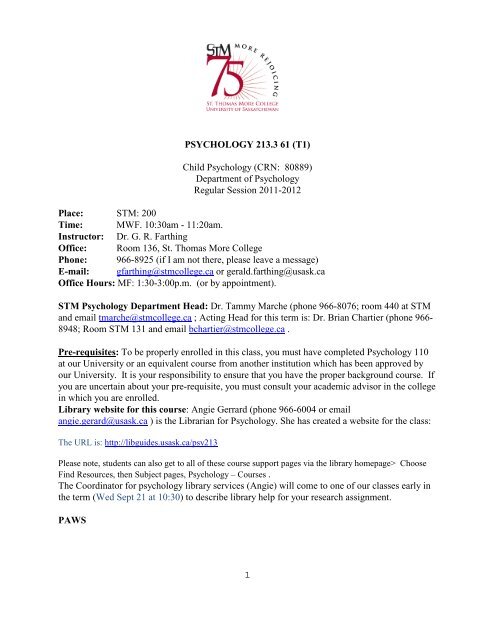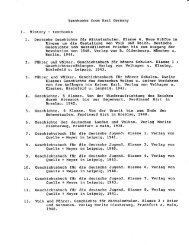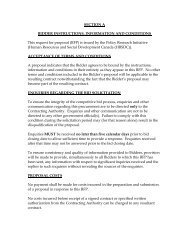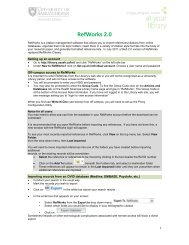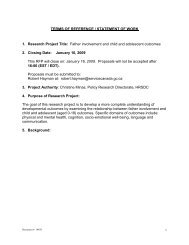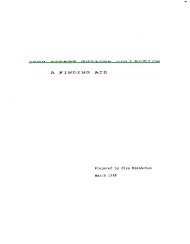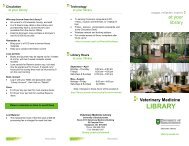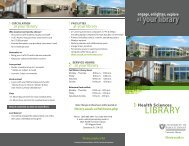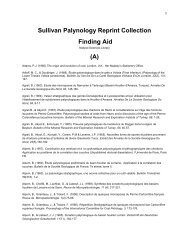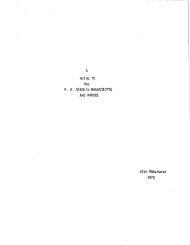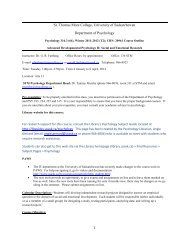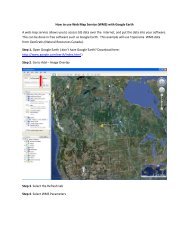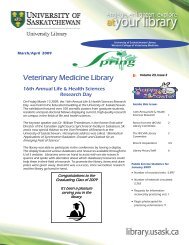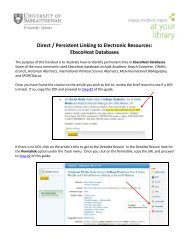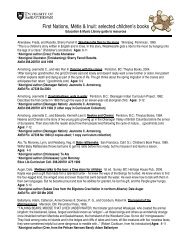T1 - University Library - University of Saskatchewan
T1 - University Library - University of Saskatchewan
T1 - University Library - University of Saskatchewan
You also want an ePaper? Increase the reach of your titles
YUMPU automatically turns print PDFs into web optimized ePapers that Google loves.
PSYCHOLOGY 213.3 61 (<strong>T1</strong>)<br />
Child Psychology (CRN: 80889)<br />
Department <strong>of</strong> Psychology<br />
Regular Session 2011-2012<br />
Place: STM: 200<br />
Time: MWF. 10:30am - 11:20am.<br />
Instructor: Dr. G. R. Farthing<br />
Office: Room 136, St. Thomas More College<br />
Phone: 966-8925 (if I am not there, please leave a message)<br />
E-mail: gfarthing@stmcollege.ca or gerald.farthing@usask.ca<br />
Office Hours: MF: 1:30-3:00p.m. (or by appointment).<br />
STM Psychology Department Head: Dr. Tammy Marche (phone 966-8076; room 440 at STM<br />
and email tmarche@stmcollege.ca ; Acting Head for this term is: Dr. Brian Chartier (phone 966-<br />
8948; Room STM 131 and email bchartier@stmcollege.ca .<br />
Pre-requisites: To be properly enrolled in this class, you must have completed Psychology 110<br />
at our <strong>University</strong> or an equivalent course from another institution which has been approved by<br />
our <strong>University</strong>. It is your responsibility to ensure that you have the proper background course. If<br />
you are uncertain about your pre-requisite, you must consult your academic advisor in the college<br />
in which you are enrolled.<br />
<strong>Library</strong> website for this course: Angie Gerrard (phone 966-6004 or email<br />
angie.gerard@usask.ca ) is the Librarian for Psychology. She has created a website for the class:<br />
The URL is: http://libguides.usask.ca/psy213<br />
Please note, students can also get to all <strong>of</strong> these course support pages via the library homepage> Choose<br />
Find Resources, then Subject pages, Psychology – Courses .<br />
The Coordinator for psychology library services (Angie) will come to one <strong>of</strong> our classes early in<br />
the term (Wed Sept 21 at 10:30) to describe library help for your research assignment.<br />
PAWS<br />
1
• The IT department at the <strong>University</strong> <strong>of</strong> <strong>Saskatchewan</strong> has recently made changes to the<br />
course tools in PAWS. For help navigating it, go to videos and documentation<br />
http://www.usask.ca/its/courses/coursetools/help_student.html<br />
• The new tools provide an opportunity to give exams and assignments on line and to have<br />
them marked on line as well. Since the new tools have been running for only 3 days now,<br />
I did not get a chance to use this feature but might do so as the semester progresses.<br />
However, I may have to have two options for students as I do not know if all can bring<br />
laptops to class. I will address this issue in class.<br />
Course Objectives:<br />
1. The primary objective <strong>of</strong> this course is to acquaint you with a range <strong>of</strong> topics within the major<br />
areas <strong>of</strong> child psychology by:<br />
a) Surveying the nature and course <strong>of</strong> normal development from conception to early<br />
adolescence with respect to the child psychology areas <strong>of</strong> biological, cognitive and<br />
personality growth;<br />
b) Teaching basic methods <strong>of</strong> investigation in the content areas;<br />
c) Reviewing research findings in support <strong>of</strong> theoretical understanding;<br />
d) Discussing applications <strong>of</strong> current knowledge to child rearing and educational<br />
practises; and<br />
e) Inviting a critical analysis <strong>of</strong> child psychological assumptions, limitations and<br />
investigations.<br />
2. A second objective is to acquaint you with data gathering strategies, library research and<br />
writing skills in child psychology by assigning a term paper.<br />
3. A third objective is to interest you in applying your knowledge about child psychology to<br />
everyday life difficulties by:<br />
a) Discussing human action and experience;<br />
b) Discussing interpersonal relationship implications <strong>of</strong> knowledge.<br />
Required Text:<br />
1. Berk, Laura E. & Roberts, William L. (2009) Child Development: Third Canadian<br />
Edition Toronto: Pearson Education Canada, Inc.<br />
There is a companion website to accompany the text. It is www.mydevelopmentlab.com . Please<br />
check the Preface for more information.<br />
I have placed a copy <strong>of</strong> the 2 nd and 3 rd edition <strong>of</strong> the textbook in the STM library. You check on<br />
them online by following the links below in order:<br />
<strong>University</strong> <strong>Library</strong> then Tool and Services (left hand column), then Course reserves, then<br />
Information for Students, then Course Reserve Lists, then in Course Name Search, Search<br />
for, write psy 213. You will then Read Materials and see that each in on a four hour reserve. It<br />
will tell you if someone else is using the material at the moment and when to expect it back.<br />
2
Suggested supplement: For those who desire a hard copy <strong>of</strong> some <strong>of</strong> the resources that are<br />
available, you may order through the Bookstore, a student guide, entitled:<br />
1. Berk, Laura E., Christensen, Claire G., Harris, Sara, Ashkenaz & Carioni, Jessica (2009)<br />
Grade Aid for Child Development (8 th Edition). Toronto: Pearson Education Canada,<br />
Inc.<br />
(Note that the Grade Aid for the Third Canadian Edition is the same as it is for the 8th Edition).<br />
Unless directed otherwise in class or by the class syllabus, you will be responsible for all <strong>of</strong> the<br />
material in the textbook even though some <strong>of</strong> that material may not be discussed in class. Exam<br />
questions may come from the material in the text that may not be covered in class.<br />
Examinations:<br />
Please note the <strong>University</strong> Examination Regulations (for the complete documents, see your Paws<br />
link to <strong>University</strong> Regulations. Note that in cases <strong>of</strong> incomplete course work, absence from final<br />
examinations and late withdrawal students must be assigned a numeric final grade. The<br />
regulations stipulate that the calculation <strong>of</strong> the final grade in these cases will assign a ZERO for<br />
all missed components and that the maximum numeric grade that can be assigned is 49%. Note<br />
also that you must make an application at the College <strong>of</strong> Arts and Science Main Office for a<br />
Deferred Examination. And note that there is a minimum performance standard in course work<br />
for you to be eligible to write the final or the deferred final examination. The standard is that<br />
30% toward you final grade has been contributed by your performance in course work and by the<br />
midterm examination up to the date <strong>of</strong> the final examination. Note also that you may be refused<br />
to take the final examination if your pr<strong>of</strong>essor deems that you have not attended a sufficient<br />
number <strong>of</strong> the classes. Excepting legitimate medical/compassionate leave, my expectation is that<br />
you attend 85% <strong>of</strong> the classes. After the first week <strong>of</strong> classes, I will assemble a seating plan and<br />
will expect you to sit in the same seat. I hope to use the information to learn your names.<br />
No computer, ipod and/or cell phone or any other electronic aid will be permitted during any<br />
examinations. There are two major examinations in this course. The first examination, the<br />
midterm, will be on Oct. 17, 2011 during the regular class time and will have different versions<br />
such that the probability <strong>of</strong> anyone around you having the same exam will be very low. It will be<br />
an in-class closed book examination and will contain up to 60 multiple choice questions on<br />
Chapters 1-7 <strong>of</strong> the course and depending on the number <strong>of</strong> students in the course it may contain<br />
short answer questions. I will hand out your computer grade sheet, approximately 10 days later<br />
(depending on the demand for computer marking) and you will have an opportunity to go over<br />
your exam during <strong>of</strong>fice hours if you choose to bring your computer grade sheet. The exam will<br />
contribute up to 20% <strong>of</strong> your final grade.<br />
The final examination will be held on a date and at a time determined by the Registrar. It, too,<br />
will be a closed-book examination and you will have three (3) hours to complete it. It will likely<br />
have two parts. The first part could be up to 120 multiple choice questions, approximately 60 -<br />
3
70% <strong>of</strong> which will be on Chapters 8-15 (thus, not covered by the previous exam). The remaining<br />
multiple choice questions will come from Chapters 1-7. The second part <strong>of</strong> the final exam will<br />
be definitions, differentiation <strong>of</strong> concepts and/or short answer essay questions from the entire<br />
course. The value <strong>of</strong> the final exam is 40% towards your final grade. Completion <strong>of</strong> both<br />
examinations is required for students to be eligible to obtain a final grade higher than 49%.<br />
Assignments:<br />
There are two assignments for this course. The first assignment is a preparation for the second. It<br />
is due on Oct. 3, 2011, is entitled, Working Toward a Thesis, and has a contributing value <strong>of</strong><br />
10%. The second assignment, due on Nov. 21, 2011, is a library research and essay assignment<br />
(thesis paper) which has a contributing value <strong>of</strong> 30% toward your final grade. See Appendix B<br />
for a description <strong>of</strong> the Assignments. Completion <strong>of</strong> both assignments is required to for<br />
students to be eligible to obtain a final grade higher than 49%. APA writing style is<br />
required. See the library web site for information about APA writing style.<br />
Evaluation:<br />
Your final grade, using the percentage system, will be determined by a weighted summation <strong>of</strong><br />
all variables contributing to the grade and by the relationship <strong>of</strong> your overall mark to the class<br />
average. Each task is graded using the percentage system. No “re-writes” <strong>of</strong> your term paper or<br />
examinations will be permitted. No penalty-free term paper extensions will be given without<br />
medical certification <strong>of</strong> illness or documentation <strong>of</strong> a compassionate reason. As indicated earlier,<br />
the final grade formulation is as follows:<br />
a) Midterm examination on Oct. 17. 20%<br />
b) First assignment, due Oct. 3. 10%<br />
c) Second assignment, term paper, due on Nov. 21 30%<br />
d) Final exam - sometime in Dec. 40%<br />
e) Bonus for attending 85% <strong>of</strong> the classes = 3%<br />
Summation for your grade is as follows:<br />
Grade=.2(Midterm) + .1(First assignment) + .3(Second assignment) +. 4(final<br />
examination). Example: If your Midterm=70%; Assignment #1=80%; Assignment#2 =<br />
75%; and final=75%, then your Grade = .2(70) + .1(80) + .3(75) + .4(75) = 74.5%.<br />
Assuming that the class average is between 70 and 74 your mark will be bumped to 75%. If the<br />
class average is higher or lower, I am required by Department Policy to either explain the<br />
variance to the standard range (i.e., an exceptionally brilliant class which happens about once in<br />
10 years) or adjust the marks on a fair basis such that the average falls within the acceptable<br />
range (e.g., use a curve adjustment). Marks that are given in the percentage system represent the<br />
application <strong>of</strong> literal descriptions in the U <strong>of</strong> S Regular Session Calendar. Therefore, if I find that<br />
you have had 3 very good marks (e.g., on two assignments and one exam) and another mediocre<br />
mark, I have the right to treat the mediocre mark as non-typical <strong>of</strong> your performance and adjust<br />
4
your grade accordingly. This outcome frequently happens with the midterm which is a learning<br />
experience for most students. The bonus will be applied at the end <strong>of</strong> classes.<br />
Missing Examinations or Assignments:<br />
If you are unable to write an exam or to turn in an assignment on time, please contact me as soon<br />
as possible and be prepared to document your reason for being absent or late (e.g. medical<br />
certificate or statement from the <strong>of</strong>fice for students with disabilities). Without careful<br />
documentation, I will accept late term papers with the penalty <strong>of</strong> 2% per day late up to a<br />
maximum <strong>of</strong> 5 days at which time your grade for the assignment will be zero. However, in<br />
order to obtain a grade for the class higher than 49% the assignment will still have to be<br />
handed in. Thus you still have to hand in a term paper whether it is late or not.<br />
These expectations are carefully outlined here and you must therefore develop good study habits<br />
to meet your deadlines. If you are ill (with certification) for the midterm examination, please<br />
contact me for a remedy. If you are ill for the final examination, you must apply for a deferred<br />
examination through the Dean’s <strong>of</strong>fice. In order not to delay feedback to other students, I reserve<br />
the right to construct remedies which consist <strong>of</strong> essay questions (e.g., 4 for the mid-term) or (in<br />
the case <strong>of</strong> a few days) to delay feedback to any until all students have written. You are asked not<br />
to discuss the content <strong>of</strong> any examination until the instructor gives permission to do so.<br />
Students with a valid medical/mental health certificate who have not competed the course<br />
work by the end <strong>of</strong> the regular class period will be assigned a grade <strong>of</strong> INC which is regulated by<br />
<strong>University</strong> policy and procedures obtainable at the Dean’s <strong>of</strong>fice.<br />
Students without a valid medical/mental health certificate and who have passed the deadline<br />
(including the penalty) will be given a score <strong>of</strong> 0% for the missed work and will not be entitled to<br />
receive an INC, according to the <strong>University</strong> policy and procedures. Given the requirement that<br />
both exams and assignments must be completed, it will be impossible for such students to<br />
earn a grade higher than 49%.<br />
If you miss an examination and/or assignment due to employment, military service, or<br />
competitive sports-related commitments, you are asked to provide a note from your employer,<br />
commanding <strong>of</strong>ficer, or coach (on letterhead) who identifies the time and duration <strong>of</strong> the duty<br />
that can not be rescheduled. If you have made a plan to be on a vacation via a pre-booked mode<br />
<strong>of</strong> travel (plane or train, etc.), you must remedy (e.g., adjust your travel when the examination<br />
schedule comes out or apply for a deferred examination at the Dean’s <strong>of</strong>fice) the situation<br />
immediately. Please note the university regulations about these matters.<br />
Students with disabilities:<br />
“If you are a student who is registered with the Office <strong>of</strong> Disability Services for Students, you may<br />
apply for unique services or arrangements to complete the requirements for this course. Normally,<br />
these services will be provided through the DSS <strong>of</strong>fice. If you have not yet registered with that<br />
<strong>of</strong>fice, please do so as quickly as possible.”<br />
5
General<br />
I am circulating these expectations during the 1st class. I welcome any questions <strong>of</strong> clarity and<br />
comments regarding the expectations. By the end <strong>of</strong> the first class, I assume that all concerns<br />
have been raised and all expectancies made clear. However, if you experience unexpected<br />
difficulties during the academic year, please discuss these with me. I will assist you within the<br />
confines <strong>of</strong> my ability and university regulations.<br />
Course Structure:<br />
A traditional lecture format supplemented with class activity/demonstrations, films/videos (when<br />
available at the time I need them), Think-Jot-Share discussion periods, and Exit Slips or the like<br />
may be used in this class. Lectures pertain to the material outlined in the syllabus for a particular<br />
week. At least one chapter <strong>of</strong> the text is covered per week. The lectures are intended to clarify<br />
your reading, to introduce new material and to present new approaches to the content in your<br />
textbook. I expect that you will have read the assigned chapters prior to class and therefore<br />
to be fully prepared to participate in the activities, Think-Jot-Share exercises and Exit<br />
Slips. I will post mini power points (i.e., brief titles <strong>of</strong> topics with key words missing) prior to the<br />
week in which they will be used. You must attend class to obtain the key words. To be ready for<br />
the examinations, I expect that you will have re-read the chapters following coverage <strong>of</strong> the<br />
material in class. Students who do not re-read the chapters will likely do poorly on the<br />
examinations. Not all <strong>of</strong> the material (i.e., material in other-than- White Background material) in<br />
your textbooks will be covered in class. Questions on your exams may come from lecture<br />
material not covered in your texts. Thus, to obtain a good grade in this course, you are<br />
encouraged to attend a great majority <strong>of</strong> the lectures. Up until the registration deadline after<br />
which no new student will be added to the class, I do not keep track <strong>of</strong> attendance. Thereafter, I<br />
do spot checks because I am responsible to refuse to give you a final examination if I deem that<br />
you have not attended a sufficient amount <strong>of</strong> classes. If you must miss a class, I expect an email<br />
either before or after (in an emergency) indicating your absence. Failure to do so will result in a<br />
forfeit <strong>of</strong> your bonus mark. Also, please try to obtain a copy <strong>of</strong> notes from your fellow students<br />
by paying them to make copies. A loss <strong>of</strong> notes could be invaluable whereas money can be<br />
replaced. I will not distribute my notes. I will begin lectures promptly. If you should happen to<br />
be late, please enter as quietly as possible. Similarly, if you must leave early, please do so<br />
quietly.<br />
Plagiarism and Academic Dishonesty: (see the quote below from Faculty Council):<br />
“St. Thomas More College follows the rules regarding Academic Dishonesty as delineated in the<br />
<strong>University</strong> <strong>of</strong> <strong>Saskatchewan</strong> Calendar. Of these, plagiarism is a particularly serious <strong>of</strong>fence that<br />
involves presenting another person’s writing, ideas or creative work as your own. When quoting,<br />
paraphrasing, describing, presenting, summarizing or translating the work <strong>of</strong> others, you must<br />
acknowledge the source <strong>of</strong> the information you use, which includes ensuring that the reader can<br />
differentiate between your words and the words <strong>of</strong> others. Sources may come in print, electronic,<br />
digital, visual or oral form, and may be provided by a published author, fellow student, artist, or<br />
Internet site. Purchasing papers is not permitted. It is your responsibility to understand what<br />
constitutes plagiarism; when in doubt, consult your pr<strong>of</strong>essor.” For further information see<br />
www.usask.ca/honesty/.<br />
6
Research experience:<br />
It is customary to ask students in second year classes <strong>of</strong> psychology to volunteer as participants in<br />
psychological research. The usual procedure is for the subject pool committee to come to a class<br />
early in the term to get some basic information from you (i.e., If you wish to volunteer, your<br />
name and where you can be reached for scheduling). I expect this to happen and have been asked<br />
to use part <strong>of</strong> a lecture for such purposes. I encourage you to volunteer and participate. Your<br />
contribution can enhance our knowledge about psychological functioning and about methods<br />
used to attain such knowledge. In addition, the experience can be valuable to you especially if<br />
you go on to plan some investigating yourself. You will know what participants experience.<br />
It is important that you understand the voluntary status. No one will force you to enter an<br />
experiment. If you should decide to volunteer, you can change your mind at any time during the<br />
process. You can request a clear description <strong>of</strong> the study and what will be expected from you.<br />
After it is finished, you can request information about the findings <strong>of</strong> the research.<br />
A clear honest participation is expected from you. If you feel like playing a "cat and mouse"<br />
game with the researcher, say no rather than confound good research. Also, if you find the procedure<br />
confusing or your actions in the research complicated, say so. It is very important that you<br />
give good feedback to research designers so they can make necessary improvements. Again,<br />
please note that the research participation is strictly voluntary. There are no penalties for<br />
not doing it.<br />
Appointments:<br />
Please note my <strong>of</strong>fice hours. Since I am teaching other classes and have administrative duties, I<br />
may not be in my <strong>of</strong>fice if you drop by. I invite you to make use <strong>of</strong> <strong>of</strong>fice hours to inquire about<br />
any aspect <strong>of</strong> the course, to identify and solve assignment problems, to review your progress, etc.<br />
You may come in groups if you wish. If another student gets there before you, you may have to<br />
wait. If you need to reach me at other times, please call and if I am unable to answer your call,<br />
please leave a message on my answering machine. You may also e-mail me if you include your<br />
name and course number in each e-mail that you send. Note that I will not respond to<br />
anonymous e-mails. I respond to approximately 200 e-mails per term so you may have to wait a<br />
few days for a response. The busiest times for student e-mail inquiries are the week prior to<br />
examinations and to assignment due dates. I answer them on a first come first serve basis so if<br />
you want to ensure that I respond prior to the examination or assignment due date, you will have<br />
to send your message to me as far in advance as possible. It may be better for you to speak to me<br />
after class or contact me by telephone.<br />
E-mail: All email correspondence using PAWS is preferred. Use only the STM e-mail address<br />
provided on this course outline for any correspondence regarding this course. The university<br />
computer use policy is given in the Calendar. Please read it so you are not surprised by<br />
interruptions in computer usage.<br />
7
Teaching Assistant: I will be using the services <strong>of</strong> a teaching assistant in this course. The<br />
assistant will help me keep track <strong>of</strong> your work, grade the assignments and manage the<br />
examinations. The assistant will be chosen based on experience with these tasks.<br />
Class Cancellation:<br />
If for any reason a class must be cancelled, I will notify you through PAWS.<br />
8
Appendix A: Class Syllabus<br />
Week or day Topic Reading<br />
1. Sept.7 Class outline & History, theory, etc. Berk (B), ch. 1<br />
2. Sept. 9 History, and Research Strategies B, ch. 2<br />
3. Sept. 12 Bio. Foundation, Prenatal dev., and birth B, ch. 3<br />
4. Sept. 19 Infancy/Physical Development B. ch. 4&5<br />
The Librarian will come one day in Sept. (to be announced)<br />
5. Sept. 26 Cognitive Development/ B, ch. 6<br />
Oct. 3 First Assignment due.<br />
6. Oct. 3 Cognitive Development/Information Processing B, ch. 6&7<br />
7. Oct. 10: Thanksgiving<br />
7. Oct. 12 Information processing / Intelligence B, ch. 7&8<br />
Oct. 17: Midterm examination (Chapters 1-7)<br />
8. Oct. 19 Intelligence/Language Development B, ch. 8&9<br />
9. Oct. 24 Language/Emotional development B. ch. 9&10<br />
10. Oct.31 Self & social development B, ch. 11<br />
11. Nov. 7 Moral development B, ch.12.<br />
12. Nov. 16 Sex differences and Gender roles B, ch. 13.<br />
13. Nov. 21 Family / Peers, media and schooling B, ch. 14 & 15<br />
Nov. 21: Term paper due (Second assignment)<br />
14. Nov. 28 Peers, Media and Schooling & windup B, Ch. 15.<br />
THE FINAL EXAMINATION IS SCHEDULED BY THE REGISTRAR.<br />
9
Appendix B: Assignments<br />
A. First Assignment (10%): Working toward a thesis.<br />
Your first assignment is intended to be a bridge toward your second assignment which is a<br />
term paper. Below, I give a definition <strong>of</strong> a thesis, demonstrate a plan <strong>of</strong> working toward a thesis<br />
statement, elaborate by giving examples and then give your first assignment.<br />
Definition <strong>of</strong> a thesis: A persuasive thesis is a declarative statement or proposition which is<br />
advanced for consideration, especially one that is to be proved or maintained against objections.<br />
The author is taking a stand, is making an argument, and is hoping to form the reader’s<br />
understanding <strong>of</strong> research (in our case, a developmental phenomenon). It is an idea that controls<br />
and shapes your paper. It is exactly what your paper is about. It is what you intend to demonstrate<br />
and everything in your paper should contribute toward your intention. It helps you set aside<br />
interesting but not centrally relevant ideas. At the end, the reader should be prepared to change<br />
his or her views about the topic or develop a view if, indeed, no view was had before the<br />
argument.<br />
Remember that, before they have read very far, readers <strong>of</strong> academic papers want to know what<br />
the paper argues as well as how the author plans to make the argument. The academic reader<br />
likely thinks, “This author is trying to convince me <strong>of</strong> something. Either I am already convinced<br />
or unsure. In any case I am interested to see how I might be further convinced or change my<br />
mind.”<br />
A thesis is not a topic. It is not a fact. It is not an opinion. It can not be answered by a simply<br />
“yes” or “no”. It has two parts: a) what you plan to argue and b) telegraph how you plan to argue<br />
it (or what kind <strong>of</strong> support is going to appear where in your argument).<br />
Steps in Constructing a good thesis:<br />
1. Carefully analyze your primary sources. Look for tensions, ambiguities, contradictions,<br />
controversies or deeper meanings. Document them.<br />
2. Write down your thought as soon as you think them. Your next idea may wreck your idea<br />
or cause you to lose concentration. Writing forces you to think clearly, logically, and<br />
concisely. You can revise your writing anytime. Revision clarifies thinking even more.<br />
3. Make your thesis prominent in your introduction <strong>of</strong> your paper. A good place in 10-15<br />
page papers is at the end <strong>of</strong> the first paragraph. Academics are used to finding theses there<br />
so they anticipate it well. They usually pay more attention to the last sentence <strong>of</strong> the<br />
introductory paragraph.<br />
4. Try to anticipate counter-arguments to your thesis. What might be said against it? What<br />
arguments might you need to refute later in you paper. Remember that every argument<br />
has a counter argument or it would not be an argument! Instead it would be a fact,<br />
opinion or a topic.<br />
10
Some Caveats about a thesis:<br />
1. It is never a question. Questions do not present arguments which are <strong>of</strong> the essence.<br />
2. It is never a list. Lists lack controversy or tension and are not arguments.<br />
3. It is never vague, combative or confrontational. A statement that “Video games are evil to<br />
children” lacks argument and may suffer due to a poor definition <strong>of</strong> evil, to being<br />
regarded as moralistic or judgmental, and to inciting a defensive reaction.<br />
4. It has a definite, defensible, arguable claim. One variable in child development plays a<br />
more important role than does another one. Your reader is likely to want to know why?<br />
5. It should be as clear and as specific as possible. Over used and general terms like “due to”<br />
are not likely to be clear or specific.<br />
Examples <strong>of</strong> a process for moving toward a thesis statement:<br />
Example 1: Title: Impact <strong>of</strong> Father Absence on Child Development<br />
Statement <strong>of</strong> Fact: In today's society, 40-50% <strong>of</strong> children grow up without the advantage<br />
<strong>of</strong> a continuous father.<br />
Announcement <strong>of</strong> purpose: I intend to show how father absence affects both male and<br />
female children. I intend to form your believe that father absence is a serious detriment to<br />
children.<br />
Thesis: Research marks serious deficits in children which are traceable to the absence <strong>of</strong><br />
a continuous father during critical childhood years. For girls, the deficit is relating to<br />
males in only the singular dimension <strong>of</strong> "cuteness." For boys, the deficit is inadequate<br />
development <strong>of</strong> leadership skills.<br />
Example 2: Title: Music videos and Childhood Depression<br />
Statement <strong>of</strong> Fact: Music videos are readily available to all children.<br />
Announcement: What follows is an argument that the music videos have become such<br />
an important part <strong>of</strong> our culture that they control children's mood states and therefore<br />
have the potential to both cause and alleviate childhood depression.<br />
Thesis: Music videos supply ready made identities for children who suffer negative selfimage,<br />
negative self-esteem and negative experiences about their role in society which<br />
either exacerbates or alleviates depression depending on the type and amount viewed.<br />
Example 3: Title: Intelligence Tests and Educational Placement.<br />
Statement <strong>of</strong> Fact: Intelligence tests are used extensively in classrooms to determine<br />
educational opportunity.<br />
Announcement: The arguments that follow will show that intelligence tests are too<br />
inaccurate and therefore should not advance privilege in a multi-cultural society. They,<br />
therefore, can lead to huge errors in judgement about the use <strong>of</strong> educational resources.<br />
Thesis: Intelligence test scores are inaccurate representations <strong>of</strong> a child's overall<br />
intelligence in that they are not sufficiently sensitive to children's socio-economic or<br />
cultural background and in that they do not measure a child's intelligence beyond the<br />
academic context.<br />
11
First assignment, Part I (2 marks):<br />
Choose #6 and if you do not have one, choose, from #1-5, one <strong>of</strong> the following Titles and<br />
formulate (either invent or read something about the topic) a clearly worded Statement <strong>of</strong> Fact,<br />
Announcement and Thesis:<br />
1. Children’s memory<br />
2. Video games and Problem solving skills<br />
3. Children who build virtues<br />
4. Gender differences in Bullying in Saskatoon Schools<br />
5. Conditions for children to give eyewitness testimony.<br />
6. Your favourite observation about child development or favourite research topic in child<br />
development .<br />
Note what is required is the correct form as indicated in the examples and not the correctness <strong>of</strong><br />
content.<br />
First Assignment, Part II (4 Marks):<br />
Using the material on thesis statements above, analyse 4 <strong>of</strong> the following 6 thesis statements.<br />
Explain why they do not qualify as effective thesis statements.<br />
1. In the pages that follow, I will examine the use <strong>of</strong> intelligence tests to issue privilege in the<br />
schools.<br />
2. The development <strong>of</strong> the Montessori method <strong>of</strong> child education.<br />
3. How to parent a child through school violence.<br />
4. Stimulation <strong>of</strong> children by mobile toys in Day Care Centres benefits some but is has<br />
drawbacks.<br />
5. The age <strong>of</strong> emancipation is steadily decreasing in single parent homes.<br />
6. Sigmund Freud was a physician, a scientist and a Jew.<br />
First Assignment Part III (4 marks):<br />
Choose a tentative topic for your term paper (you may carry it to your second assignment if you<br />
wish), find 4 empirical articles on that topic and create a thesis statement which could be<br />
supported by those empirical articles.<br />
1. Choose a topic:<br />
From Child Psychology topics about which there is literature in our library, you may get an idea<br />
<strong>of</strong> what topic to choose. From papers <strong>of</strong> students in the past, a sample list <strong>of</strong> suggested Topics is<br />
as follows: Victimization <strong>of</strong> Children, Parental Burnout and its impact on children’s emotional<br />
health, Child maltreatment, Daily life hassles in children, Sports and children, Impact <strong>of</strong><br />
Marriage or divorce on children, Poverty in children, Religion/ spirituality in children,<br />
Psychological sense <strong>of</strong> community in children, alternatives to Day Care, Home schooling.<br />
Depending on your interest and your perusal <strong>of</strong> our textbook, other topics may be more relevant<br />
to you.<br />
It is to your advantage to choose your topic as soon as possible. Note that our library holds one<br />
12
copy <strong>of</strong> several journals and has electronic access to others. About 200 people per term from Psy<br />
213 alone will use those journals. Examples <strong>of</strong> relevant journals are: Journal <strong>of</strong> Child<br />
Psychology and Psychiatry, American Journal <strong>of</strong> Othopsychiatry, Developmental<br />
Psychology, Pediatrics, Journal <strong>of</strong> Abnormal Child Psychology.<br />
2. Find empirical articles. Empirical means derived from or guided by experiment or by<br />
experience. For an empirical study, one designs an experiment and/or observes variables under<br />
carefully controlled conditions or interviews people first and then analyses the data obtained in<br />
order to determine the effects <strong>of</strong> the variables.<br />
Use the <strong>Library</strong> resources to obtain 4 empirical studies. Cut and paste the Abstracts <strong>of</strong> the 5<br />
studies into Word as part <strong>of</strong> your assignment. A sample Abstract <strong>of</strong> an Empirical article (i.e.,<br />
one invented by me) is as follows:<br />
Abstract<br />
Findings are presented <strong>of</strong> a cross-sectional study <strong>of</strong> children raised in mother lead single parent<br />
families. Twenty -five boys and 25 girls <strong>of</strong> mother-lead single parent families matched with the<br />
same in an intact family were interviewed at age 10 years <strong>of</strong> age. Standardized interviews were<br />
used to obtain data on interpersonal relationship skills, on family characteristics and on the<br />
child's gender role behaviour from both the children and their mother and the Perceived Social<br />
Support (PSS) scale was used to collect data on interpersonal relationship experiences. Although<br />
children from single parent families were more likely to initiate interpersonal interactions as<br />
indicated by the PSS, children from intact families were less likely to report stress or conflict<br />
from their interpersonal interactions. The results support the contention that children from single<br />
parent families are interpersonally less skilled as compared with those from intact families.<br />
Note that the Abstract contained key information which identifies it as an empirical study. First<br />
a population to study was identified. Second a research question was specified. Third methods <strong>of</strong><br />
collecting experience were noted (interviews and the PSS). Fourth, results were summarized and<br />
finally a conclusion was presented. Make sure the articles you find have these ingredients in<br />
the Abstract.<br />
3. Create a thesis statement:<br />
Using the definition above and building on your experience with the first two parts <strong>of</strong> the<br />
assignment above, propose a thesis statement. For example, from the topic area <strong>of</strong> childhood<br />
cognition, the following illustrate possible thesis statements:<br />
(a) There is very little recent support for specific claims from Psychologists about children's<br />
use <strong>of</strong> the availability heuristic. (This would indicate that the articles you found do not<br />
support what the psychologists claimed.)<br />
(b) Recent research evidence on the mid-childhood population adds a new understanding to<br />
the availability heuristic which was not covered by current theory. (In this case you would<br />
have found more recent knowledge about adolescent's use <strong>of</strong> the availability heuristic and<br />
the new evidence questions the existing theory.)<br />
13
4. Using Word summarize one (1) <strong>of</strong> the empirical articles using the six questions provided<br />
below.<br />
Your summary <strong>of</strong> one <strong>of</strong> the five articles should use the following categories <strong>of</strong> themes for your<br />
paragraphs:<br />
1. The research question or hypothesis which was investigated and the theory behind it was .....<br />
2. The method <strong>of</strong> obtaining empirical data was ...... (explain the population sampled, the research<br />
design, the measures <strong>of</strong> psychological phenomenon and procedures necessary to obtain the data)<br />
3. The results <strong>of</strong> the study are ...<br />
4. The limitations as identified by the authors are ......<br />
5. The conclusions <strong>of</strong> the researchers are .....<br />
6. What I thought about the research is... (Can you trust the research to give good empirical<br />
evidence).<br />
5. Include the abstracts <strong>of</strong> all four articles you found. Select the references, have them formatted<br />
and download them into Word.<br />
14
B. Second Assignment (30%): Term paper (Thesis paper)<br />
Your term paper (second assignment) is to write a 10-15 page double spaced 12 point font<br />
persuasive thesis paper ( no less than 3500 words, formatted to APA style and printed on a good<br />
quality printer) on a topic <strong>of</strong> central relevance to child psychology. Remember that a thesis paper<br />
makes a specific claim about what has been discovered in research on the particular topic <strong>of</strong> your<br />
choice and examines the evidence in support <strong>of</strong> that thesis. Thus you must examine 4 empirical<br />
articles from journals which publish empirical research pertaining to child psychology. Make<br />
sure that each <strong>of</strong> the articles reports an empirical study on a topic having to do with children’s<br />
behaviour and development pertaining to the topic <strong>of</strong> your choice. Note that a review article or<br />
an opinion paper (journalist piece) will not be appropriate for this assignment. Following<br />
the paragraph stems above, part <strong>of</strong> your assignment is to prepare a summary <strong>of</strong> the problem,<br />
method, results, discussion and conclusions <strong>of</strong> the four articles. Thus, your summary <strong>of</strong> each<br />
empirical article must include a description <strong>of</strong> the research question or hypothesis which was<br />
examined in the study, a description <strong>of</strong> the method used to investigate the research question, a<br />
description <strong>of</strong> the measures <strong>of</strong> psychological phenomena under investigation including evidence<br />
for their reliability and validity, a description <strong>of</strong> how the data were collected, a description <strong>of</strong><br />
what was discovered (i.e. which hypotheses were supported or what answers were obtained for<br />
the research questions) and a discussion <strong>of</strong> the limitations <strong>of</strong> the study (i.e., to what population<br />
can we generalize the findings, are there competing explanations for the findings or are there<br />
variables that need to be taken into account in subsequent studies, etc.)<br />
At the beginning <strong>of</strong> your thesis paper, you must introduce your topic by defining it and locating it<br />
within the general field <strong>of</strong> psychology. You must then present a specific thesis or proposition<br />
about a concept, a discovery or theoretical idea for which you hope to provide evidence. You<br />
must provide a summary <strong>of</strong> each <strong>of</strong> four empirical articles you choose and show how each <strong>of</strong> the<br />
articles supports your thesis. You must give your critique <strong>of</strong> the research articles (i.e., indicate<br />
why you trust the evidence given in the studies and determine whether the inevitable flaws in the<br />
research studies cause you to be cautious about your claim <strong>of</strong> support to your thesis from the<br />
evidence given in those articles.) Be sure to discuss any possible threats to internal and external<br />
validity posed by the research design(s) used (see Chapter 2 <strong>of</strong> our text.). Your conclusion must<br />
indicate how well the research you quoted supports the thesis <strong>of</strong> your paper. You must hand in a<br />
copy <strong>of</strong> the Abstract <strong>of</strong> each <strong>of</strong> the empirical articles you choose. (Some <strong>of</strong> all <strong>of</strong> these<br />
abstracts maybe from your first assignment).<br />
The main body <strong>of</strong> your paper develops the thesis and provides references to your library research<br />
sources to back up your claim. Be careful to document the ideas and references. Please note that<br />
it is an academic <strong>of</strong>fence, called plagiarism, to use another's (including students who have written<br />
papers in preceding years) ideas without acknowledging them. Important points are:<br />
1. Spelling, grammar, neatness and organization are crucial.<br />
2. Your title page must include the title, author, class, and date and running head.<br />
3. On the second page must appear an Abstract which is a summary <strong>of</strong> your thesis<br />
statement, a summary <strong>of</strong> your library research regarding the thesis and a summary <strong>of</strong><br />
your conclusion. It should resemble the abstracts <strong>of</strong> the research studies you found.<br />
15
4. The third page must begin with an introduction to your topic, a statement <strong>of</strong> purpose, a<br />
definition <strong>of</strong> important terms (with reference to a psychological dictionary or other source<br />
for the definition) and your thesis statement. You must clearly identify your thesis<br />
("The thesis <strong>of</strong> this paper is ..."<br />
5. The body <strong>of</strong> your paper develops your thesis. You will reference the articles you<br />
found in your library research by describing the research problem identified therein,<br />
summarizing the methods used to obtain research observations and summarizing the<br />
conclusions <strong>of</strong> the researchers as indicated above.<br />
6. The ending must identify your conclusions regarding your thesis.<br />
7. The last page is a reference list <strong>of</strong> all works cited in your paper. In following the APA<br />
style, you do not use footnotes. Instead in your text you identify ownership <strong>of</strong> ideas by<br />
author and date as follows: "Fisher and Byrne (2003) stated that..."<br />
8. You must hand in a copy <strong>of</strong> the Abstract <strong>of</strong> each <strong>of</strong> the empirical articles you<br />
choose.<br />
9. You must attach the Evaluation Sheet which appears at the end <strong>of</strong> this outline.<br />
10. Please submit two copies <strong>of</strong> your paper, one <strong>of</strong> which is electronic. One will be<br />
returned to you with your evaluator’s comments. The other will be kept as a backup<br />
for possible appeals and checks on plagiarism. Note that the electronic submission<br />
will be used for checks for plagiarism.<br />
You must attach the Evaluation Sheet which appears at the end <strong>of</strong> this outline.<br />
Twenty percent <strong>of</strong> the grade for your paper will reflect the mechanics <strong>of</strong> writing in psychology.<br />
Use the resources on the <strong>Library</strong> Website for this class as the guide against which you evaluate<br />
your own writing. Eighty percent will reflect the content, development <strong>of</strong> your thesis, and<br />
conclusions. Your paper will be graded according to the following criteria:<br />
1. Abstract, introduction, statement <strong>of</strong> purpose, definitions, and thesis statement: (5 points)<br />
2. Review <strong>of</strong> relevant empirical articles. Summarize and critique (can we trust the evidence from<br />
the studies?) each <strong>of</strong> the articles in turn. In other words, do the inevitable flaws in research cause<br />
us to be cautious about what the authors claim to be the findings from their research? (10 points<br />
– 2.5 for each <strong>of</strong> 4 articles).<br />
3. Critique, limitations <strong>of</strong> the studies, relevance to your thesis (5)<br />
4. Statement <strong>of</strong> support for your thesis found in each <strong>of</strong> the articles and conclusion, suggestions<br />
for future research (5 points)<br />
5. Mechanics and evaluation <strong>of</strong> your writing (5 points) (Use <strong>of</strong> the APA writing style and unity;<br />
support; coherence, effective sentence skills and logical development <strong>of</strong> your points).<br />
The following evaluation sheet serves as my guide to the criteria for grading your term paper.<br />
You must hand this Evaluation Sheet as the last page <strong>of</strong> your term paper.<br />
16
Psychology 213:Student Evaluation: Term paper<br />
(Attach to the back <strong>of</strong> your paper)<br />
Student's Name:<br />
A. Term Paper (30%):<br />
1. Abstract, introduction, statement <strong>of</strong> purpose, definitions and thesis statement (5):<br />
2. Summary <strong>of</strong> 4 relevant research articles (theory, hypotheses, method, findings, conclusions<br />
(10 points -2.5 for each <strong>of</strong> 4 empirical articles):<br />
3. Critique, limitations <strong>of</strong> the studies, relevance to your thesis (5)<br />
4. Your claim <strong>of</strong> support for your thesis, conclusions and suggestions for future research which<br />
might help support your thesis (5):<br />
5. Evaluation <strong>of</strong> your writing (APA Format):<br />
a. unity (1):<br />
b. support (1):<br />
c. coherence (1):<br />
d. effective sentence skills (1):<br />
e. logical development <strong>of</strong> your points (1):<br />
7. Total: /30<br />
G. Farthing<br />
17


